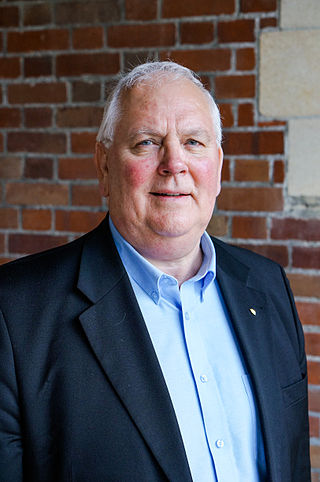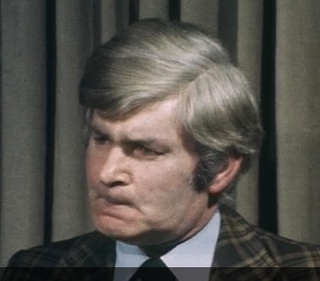Related Research Articles

The Ulster Democratic Party (UDP) was a small loyalist political party in Northern Ireland. It was established in June 1981 as the Ulster Loyalist Democratic Party by the Ulster Defence Association (UDA), to replace the New Ulster Political Research Group. The UDP name had previously been used in the 1930s by an unrelated party, which on one occasion contested Belfast Central.
David Thomas Kerr is a politician from Northern Ireland who is the Chairman of the UK-wide Third Way.
The Volunteer Political Party (VPP) was a loyalist political party launched in Northern Ireland on 22 June 1974 by members of the then recently legalised Ulster Volunteer Force (UVF). The Chairman was Ken Gibson from East Belfast, an ex-internee and UVF chief of staff at the time. The success of the Ulster Workers Council Strike had shown some UVF leaders the political power they held and they sought to develop this potential further. The UVF had been banned by the Government of Northern Ireland in 1966, but was legalised at the same time as Sinn Féin by Labour Secretary of State Merlyn Rees in April 1974 in order to encourage a political path for Loyalist and republican paramilitary groups.

The Ulster Third Way was the Northern Ireland branch of the Third Way and was organised by David Kerr, who had previously campaigned as an 'independent Unionist' as well as for the British National Front. It followed an Ulster nationalist ideology.
The Ulster Political Research Group is an advisory body connected to the Ulster Defence Association (UDA), providing advice to them on political matters. The group was permanently founded in January 2002, and is largely a successor to the Ulster Democratic Party.

Ulster nationalism is a minor school of thought in the politics of Northern Ireland that seeks the independence of Northern Ireland from the United Kingdom without joining the Republic of Ireland, thereby becoming an independent sovereign state separate from both.

Ulster loyalism is a strand of Ulster unionism associated with working class Ulster Protestants in Northern Ireland. Like other unionists, loyalists support the continued existence of Northern Ireland within the United Kingdom, and oppose a united Ireland. Unlike other strands of unionism, loyalism has been described as an ethnic nationalism of Ulster Protestants and "a variation of British nationalism". Loyalists are often said to have a conditional loyalty to the British state so long as it defends their interests. They see themselves as loyal primarily to the Protestant British monarchy rather than to British governments and institutions, while Garret FitzGerald argued they are loyal to 'Ulster' over 'the Union'. A small minority of loyalists have called for an independent Ulster Protestant state, believing they cannot rely on British governments to support them. The term 'loyalism' is usually associated with paramilitarism.
The Irish Independence Party (IIP) was a nationalist political party in Northern Ireland, founded in October 1977 by Frank McManus and Fergus McAteer. The party was effectively a merger of Unity and the Nationalist Party, as the bulk of activists and councillors from the two movements joined IIP. However several independent councillors also joined the party. It was boosted in the late 1970s by the defection of a prominent Protestant Larne Social Democratic and Labour Party (SDLP) councillor, John Turnley, later the party chairman, who was killed in 1980 in Carnlough, County Antrim, by an attack claimed by the Ulster Defence Association.
The Ulster Independence Movement was an Ulster nationalist political party founded on 17 November 1988. The group emerged from the Ulster Clubs, after a series of 15 public meetings across Northern Ireland. Led by Hugh Ross, a Presbyterian minister from Dungannon, County Tyrone, the UIC sought to end what it saw as the tyranny of rule from London and instead set up an independent Northern Ireland.

Albert Glenn Barr OBE was a politician from Derry, Northern Ireland, who was an advocate of Ulster nationalism. For a time during the 1970s he straddled both Unionism and Loyalism due to simultaneously holding important positions in the Vanguard Unionist Progressive Party and the Ulster Defence Association.
Hugh Ross is a Presbyterian minister and member of the Orange Order, who was previously the leader of the now defunct Ulster Independence Movement (UIM).
The Ulster Loyalist Central Co-ordinating Committee (ULCCC) was set up in 1974 in Belfast, Northern Ireland in the aftermath of the Ulster Workers Council Strike, to facilitate meetings and policy coordination between the Ulster Workers Council, loyalist paramilitary groups, and the political representatives of Ulster loyalism.
The Ulster Movement for Self-Determination was a minor Ulster nationalist political movement in Northern Ireland.

The Donegall Road is a residential area and road traffic thoroughfare that runs from Shaftesbury Square on what was once called the "Golden Mile" to the Falls Road in west Belfast. The road is bisected by the Westlink – M1 motorway. The largest section of the road, east of the Broadway junction with the Westlink, has a community which self-identifies as predominantly Protestant while the community on the other side of the Westlink – M1 motorway self-identifies as predominantly Catholic.
The Shankill Defence Association was a loyalist vigilante group formed in May 1969 for the defence of the loyalist Shankill Road area of Belfast, Northern Ireland during the communal disturbances that year.

John Dunlop McKeague was a Northern Irish loyalist and one of the founding members of the paramilitary group the Red Hand Commando in 1970. Authors on the Troubles in Northern Ireland have accused McKeague of involvement in the Kincora Boys' Home scandal but he was never convicted. He was shot dead by the Irish National Liberation Army (INLA) in Belfast in January 1982.
Andrew Tyrie is a Northern Irish loyalist paramilitary leader who served as commander of the Ulster Defence Association (UDA) during much of its early history. He took the place of Tommy Herron in 1973 when the latter was killed, and led the organisation until March 1988 when an attempt on his life forced him to resign from his command.

William Smith was a Northern Irish loyalist, paramilitary, and politician. He had been involved in Ulster loyalism in various capacities for at least forty years.
Noel Docherty was a Northern Irish loyalist activist who was close to Ian Paisley during Paisley's early years in politics. He served as leader of the Ulster Protestant Volunteers and was imprisoned for his involvement in procuring explosives for that organisation.
Down Orange Welfare was an Ulster loyalist paramilitary vigilante group active in Northern Ireland during the 1970s. Operating in rural areas of County Down, the group faded after failing to win support away from larger groups such as the Ulster Defence Association (UDA) and Ulster Volunteer Force (UVF).
